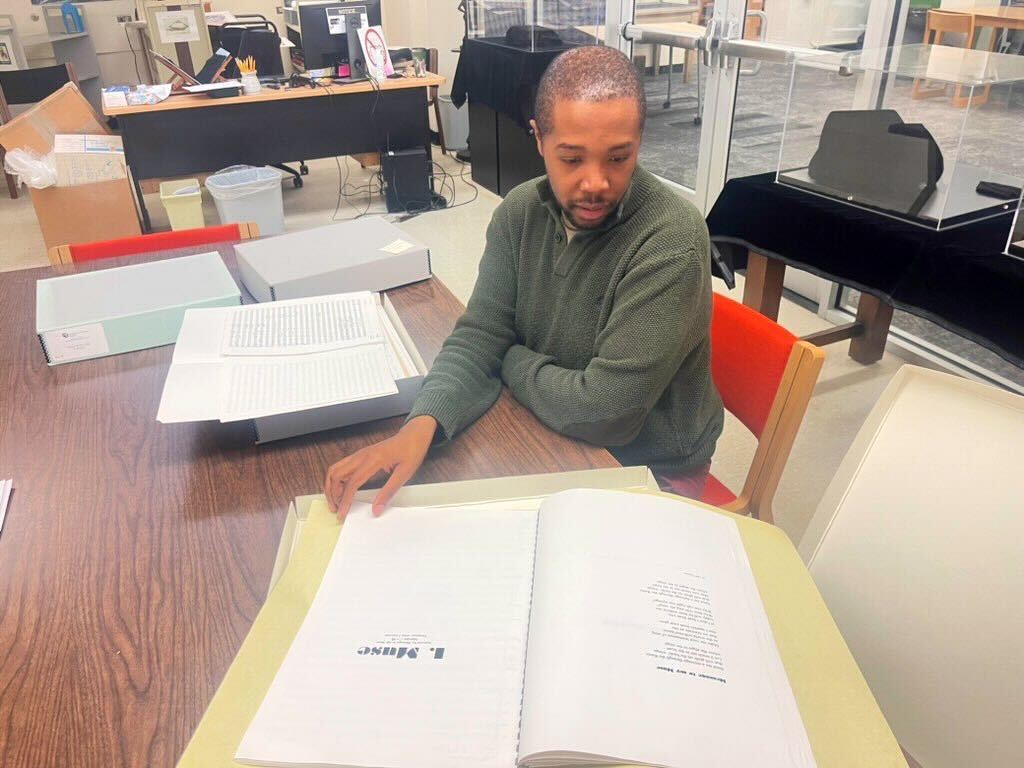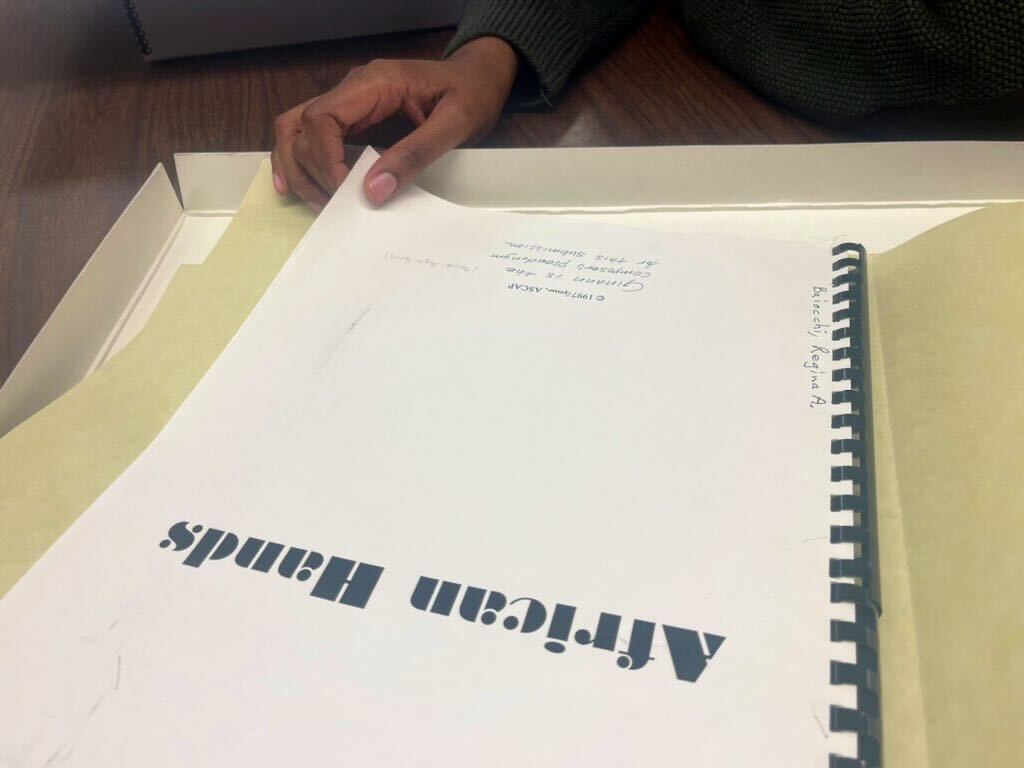
When Kedrick Armstrong ponders his future, the podiums he might climb as his career as a conductor continues its meteoric rise, he admits it’s hard to envision a particular place.
“The dream has been, and I think will always be to make music with people who love it as much as I do,” he says. “And for me, that doesn't live in a city, that doesn't live in a hall … it's place neutral, but it's experience rich.”
And, given his journey thus far, one can completely understand the sentiment. After leaving his home in the South Carolina low country after high school, he didn’t expect to end up at Wheaton College, a conservative, predominantly white university, where Armstrong says he was the only Black person in the music school. Similarly, when it came time to pursue his masters degree, the University of Colorado Boulder, and its checkered history with Black students, may not have immediately been top of mind.
But while fate’s finger can sometimes be fickle, Armstrong’s feet – along with his head and heart – have been comfortably ensconced in Colorado. As was the case at Wheaton, Armstrong is decidedly in the minority at CU — he says he's just one of "maybe" seven Black students in the music school, but he's been able to manage his environment because of the example set by his parents, who also often found themselves working in predominately white settings.
"There was always this, 'This is how you function in mixed company' that fueled me, both at Wheaton and here at CU," Armstrong says. "It's just like, 'Oh yeah, I know how to navigate this space.'"
The space that Armstrong finds himself in one early Spring day, is the archives and instruction room on the third floor of the CU’s Norlin library. It's a haphazard jumble of file cabinets, containers and knickknacks of various shapes and sizes — and the lighting could probably use an upgrade as well. But as Armstrong sits at a table, unearthing pages of music, the melodies practically leap out from the boxes before him. The compositions are part of a compilation which Armstrong says "contain some of the most brilliant music by Black female composers, and much of the music in these boxes, crazy enough, has never been heard by public ears."
"This was kind of the only reason that I ended up in Colorado.”
Finding his calling
What drew Armstrong to the West were the labors of Helen Walker-Hill. The wife of George Walker, the first Black person to receive the Pulitzer Prize for music, Helen Walker-Hill was herself an accomplished pianist and musicologist, working as an adjunct professor at CU in the 1980s. In 1992 she wrote a book on piano music by Black women composers, setting her along a path that resulted in her eponymous collection, consisting of correspondence, newspaper articles, reference notes, photographs, biographical information – and more than 800 musical scores by Black women composers.
“I began looking at women composers in general, but I wanted to specialize in a more confined area,” Walker-Hill recalled in a 2013 interview. “I thought, ‘What kind of women composers do I want to specialize in?’ First, I thought, American women composers, then, Black women composers.
“I thought, ‘I don’t know of a single one’ – this despite the fact that, as the wife of George Walker, I had met many of them … I didn’t know they were composers.”
For Armstrong, having access to the collection is like waking up on Christmas morning every day, while standing in the middle of a firehose.
"It's the magnitude of information," he says. "And for me, it was both so inspiring to see the breadth of work by all of these different Black female composers, many of them who I'd never heard of before, but then, at the same time, you're met face-to-face with the weight of the fact that most of these pieces have never been published. They've never been performed, they've never been recorded."
"You know, no one really knows what really is in this archive."
Finding the Walker-Hill collection was an unexpected treasure for Armstrong, and while it may not map out exactly where he’ll go after he leaves CU (his work on his Masters will be completed by the end of April), it has unquestionably defined who he’ll be when he gets there. Last year, the Washington Post heralded Armstrong for taking "a lead role in confronting issues of diversity (or the lack thereof) in classical conservatory curriculum."
It is a stance that began from a place of self-discovery.
“It was around 2020; the pandemic happened, the civil unrest (after the death of) George Floyd – all of us were kind of, I think, reconciling our life and our work and our vocation,” Armstrong says. “ And for me, as a Black conductor/musician, I realized at that point in my life that I hadn't really studied or engaged with a lot of Black composers, Black music. I had gone through all of my music schooling and couldn't really remember ever playing a piece by a Black composer, or studying a piece by a Black composer.
“And so I started to do a lot of digging on my own, and that digging led to this collection.”

If Walker-Hill was embarrassed by her lack of knowledge of Black female composers, she made up for that oversight, compiling the music of women like Irene Britton Smith, who worked as a teacher for almost 50 years in the Chicago public school system. In 1946, she took a sabbatical to study composition at the Juilliard School of Music; over the next 16 years she wrote dozens of pieces.
“It was in her free time; something that she did in the summers where she could steal time away in her off time from teaching,” Armstrong says. She worked as a composer, but she never considered herself to be a composer.”
Britton Smith is one of the reasons Armstrong came to Boulder. She and the other composers found in the collection provided a sense of grounding for the 28-year-old Armstrong. While appreciative of the sizable impact Black people have had in areas like R&B and Jazz, Armstrong wanted to meld his heritage with long-developed visceral feelings for classical music.
“I grew up as a gospel church pianist, and there was this interesting moment when I chose the clarinet,” he says. “I decided (that) to dedicate my life to classical music, I felt that I had to part with this part of me that was, you know, my musical being since birth. To fit into classical music, to achieve a level of success in classical music. I had to dedicate my life to classical music."
“And in that conversation, these composers, musicians of color, composers of color, weren't really prevalent in that conversation. And so, around 2020, there was a lot of shame, I think, when I started to unearth a lot of these composers and discover for myself a lot of these composers, and realized that these were names that I had never heard of before, music that I had never witnessed before, and a breath of legacy that had really been lost in sort of the music scholarship.”
Since then, Armstrong has been on a mission to bring that music to everyone. Britton Smith wrote an orchestral piece, Sinfonietta, in 1956 as part of her graduate program, however it had never been performed publicly until Armstrong brought it to the CU Symphony Orchestra. In addition, he adds, "I'm working on publishing the first performance edition that this piece has ever been honored with, because it sadly has sat on the shelf for all this time."
In good company and in control...wherever that may be
For those with a nodding relationship classical music, the conductor is often seen as a larger-than-life figure, perhaps not very far removed from the always demanding, sometimes out-of-control maestro that actress Cate Blanchett played in her Oscar-nominated role in "Tar." But while acknowledging the real-life potential for being autocratic on the podium, in his work, Armstrong chooses a different tact. One reason is the smile that perpetually creases his boyish face -- which also kind of makes it hard to go scorched earth on the musicians seated before him.
"I've been told that I'm not mean, so I will, I will trust my musician's words on that," Armstrong says with a chuckle. "I think for me being the age that I am and kind of seeing this shift, you know, from the day and age when the Toscaninis, the Fritz Reiners, you know, these conductors who did kind of have this control and power, this authoritarian sort of idea of who they were and how they worked as a conductor. And I don't think it works anymore. I don't think musicians respond well to that. I don't think they play their best under those circumstances.
"I like to take the approach of being a collaborator amongst colleagues; I'm 28 -- I'm often working with people who have been playing their instrument for that long, so who am I to show up on the podium and to tell someone else how to do the thing? It works so much better for me when I can bring what I have, what I know, what I've studied, what I've learned, you know, the perspective that I have about a piece -- which I think every conductor is responsible for having a perspective -- and listening to what the orchestra gives me.
"You know, maybe we phrase it like the first clarinet wants to phrase it -- I never thought of doing it that way because I haven't been playing my instrument that long. So how can I collaborate with the musicians so that they all feel that they have ownership in the final product?"
One suspects Armstrong will maintain that cheery demeanor, happily partnering with musicians even when it (eventually) gets to the point where his features stop calling for him to be carded whenever he orders an adult beverage. As to where that might be...
"It is truly a miracle that I am able to work in the ways that I am able to work at 28 ... (but) there's this idea of truly wanting to establish roots someplace," he says. "I was in Chicago eight or nine years and truly really discovered my place inside of a musical community, and Chicago has given me, and continues to give me so much as an artist -- and the two years here in Colorado have been really transformative."
"And so I think for me now, it's that idea of, 'Okay, so where do I, for the next five, 10 years, establish myself and truly begin to build on all of the things that I've learned in the past? How can I best serve whatever community that I'm called to next as an artist?'"
"I've always tried to keep it that open, you know, it's never been about, you know, a specific orchestra, a specific town, a specific thing. It's more of a concept of how I want to work and how I like to be. And, you know, wherever the ground is most fertile for that kind of work, that is where I want to land."








